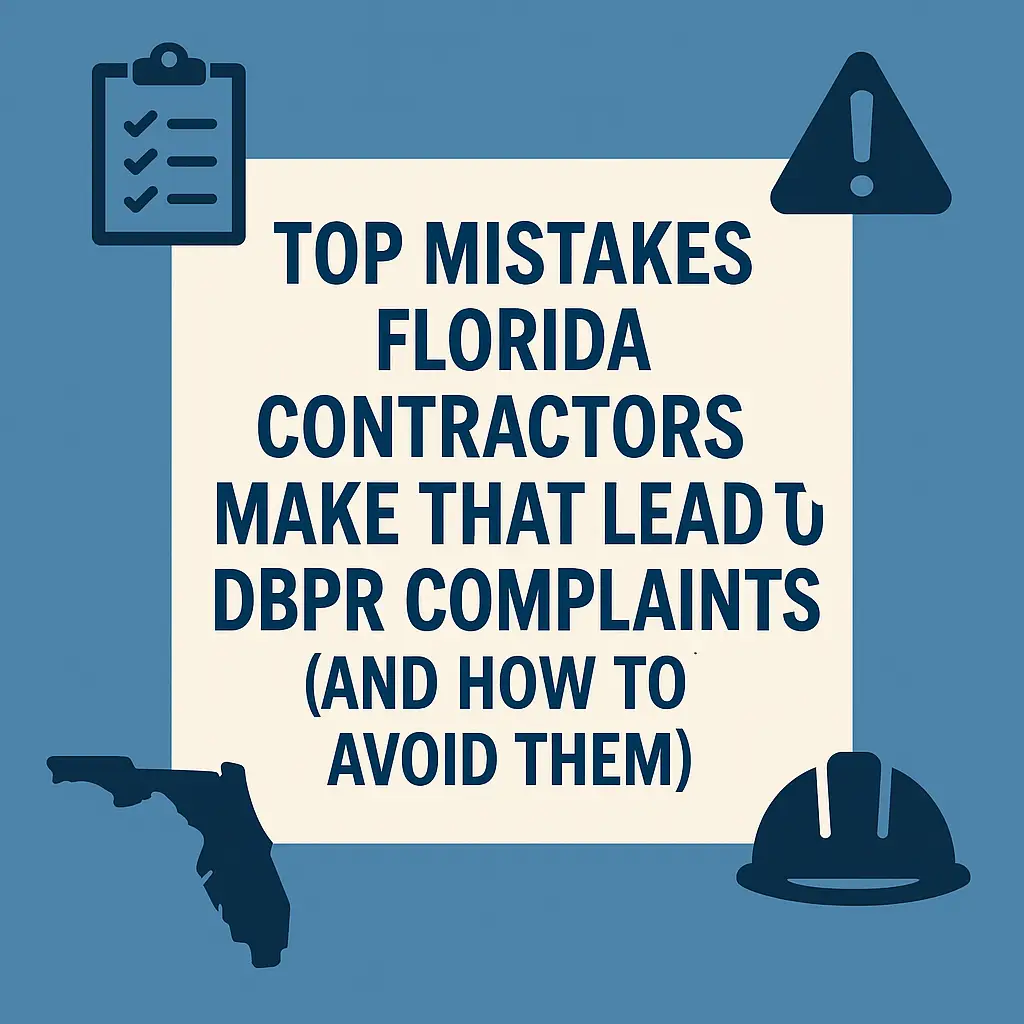Protecting your contractor’s license is protecting your business and future. In Florida, even a single DBPR (Department of Business and Professional Regulation) complaint can result in investigations, fines, license suspension, or worse. Many of these complaints arise from avoidable mistakes. Knowing the most common pitfalls can help you stay ahead of the game and safeguard your license.
At Douglas Firm, we help contractors respond to DBPR complaints and prevent them in the first place. Here’s what you need to know:
Failing to Pull Proper Permits
One of the fastest ways to trigger a DBPR complaint is performing work without obtaining the correct permits. In Florida, even minor construction projects often require permits. Homeowners, competitors, and local building departments frequently file complaints when they discover unpermitted work.
Avoid it: Always confirm permitting requirements before starting any job, even small projects.
Related Resource: DBPR Complaints | Unlicensed Contracting Defense
Improper or Incomplete Contracts
A handshake deal or a vague “estimate” is a recipe for disaster. Contractors without clear written agreements often face disputes over scope, payments, and deadlines. These disputes can quickly escalate into formal complaints.
Avoid it: Use detailed contracts that specify the work, materials, payment terms, and responsibilities of each party.
Related Resource: Account Receivable Collections & Payment Disputes
Not Maintaining License Qualification Properly
If you’re a qualifier for your own company or someone else’s, Florida law requires active participation and oversight. Allowing someone to “rent” your license without control of operations is illegal and a leading cause of DBPR complaints.
Avoid it: Maintain regular oversight, review operations, and ensure compliance with the scope of your qualifying role.
Related Resource: Construction and Electrical Qualifier Agreements
Mishandling Construction Liens
Contractors have powerful lien rights in Florida, but they must be used carefully. Filing an overstated lien, a lien with wrong details, or a lien on a property you weren’t authorized to work on can result in DBPR complaints and even criminal liability.
Avoid it: Ensure strict compliance with Florida lien law procedures and deadlines.
Related Resource: Florida Lien Machine
Hiring Unlicensed Subcontractors or Laborers
Even if your license is in good standing, hiring unlicensed subcontractors or laborers for regulated work can trigger a DBPR violation. You are responsible for ensuring that all personnel on the project meet licensing requirements where applicable.
Avoid it: Verify the license status of all subcontractors and document your due diligence.
Conclusion
Your Florida contractor’s license is one of your most valuable business assets. Avoiding these common mistakes can dramatically reduce your risk of DBPR complaints. If you are facing a complaint, or want to proactively review your compliance practices, Douglas Firm is here to help.
Contact us today for a consultation and protect your business before problems arise.
Related Resources:
- DBPR Complaints | Unlicensed Contracting Defense
- Account Receivable Collections & Payment Disputes
- Construction and Electrical Qualifier Agreements
- Florida Lien Machine
FAQs:
What happens if someone files a DBPR complaint against me?
The DBPR will investigate, which may include interviews, records requests, and site inspections. If probable cause is found, formal disciplinary action may be initiated.
How long does a DBPR investigation take?
Investigations can take several months to over a year, depending on the complexity of the complaint and the DBPR’s caseload.
Can a DBPR complaint impact my ability to get new jobs?
Yes. Many clients and general contractors check DBPR complaint history before awarding jobs, so it’s important to address complaints quickly and professionally.
Douglas Firm – Helping Florida Contractors Protect What They’ve Built.
RELATED ARTICLES

